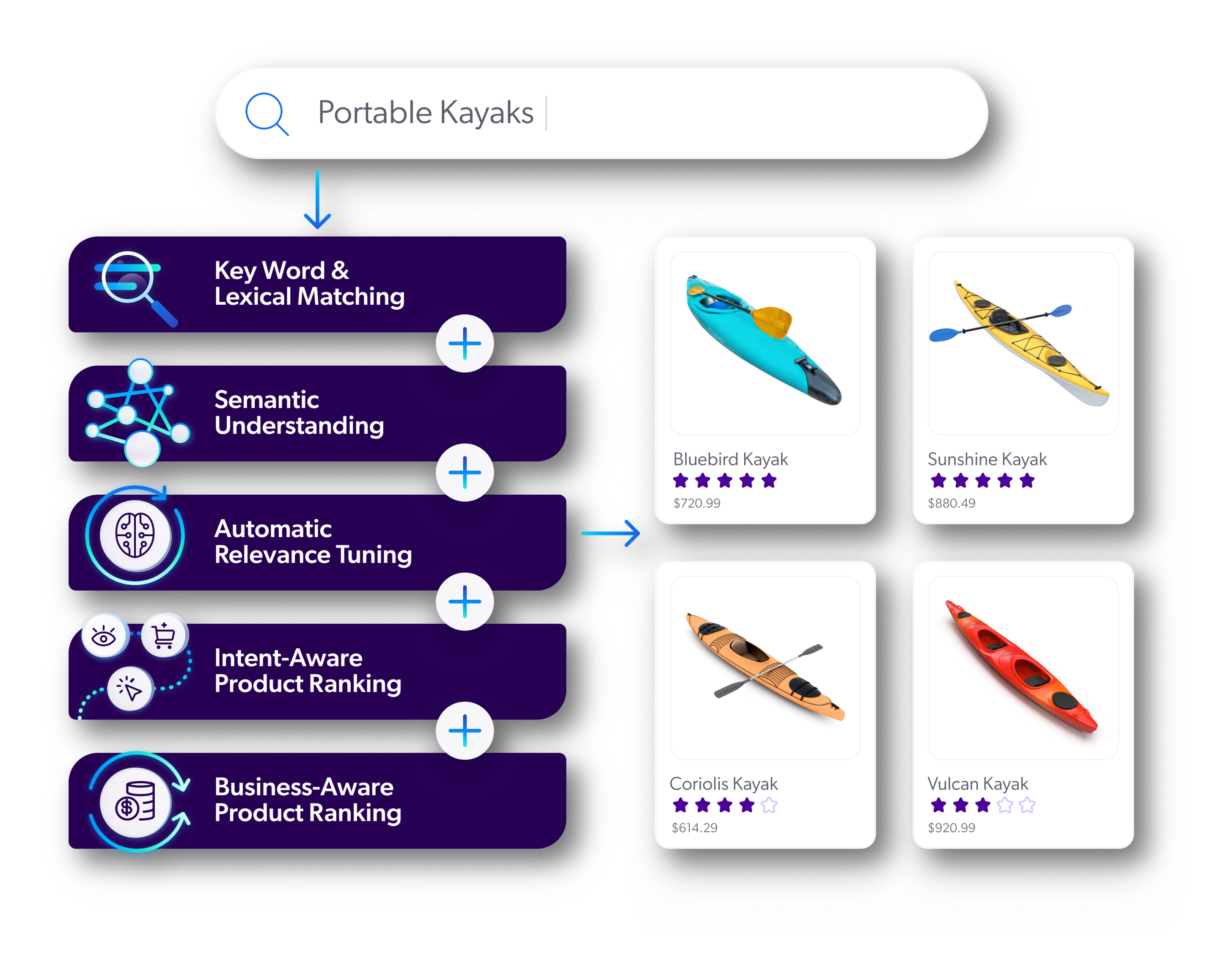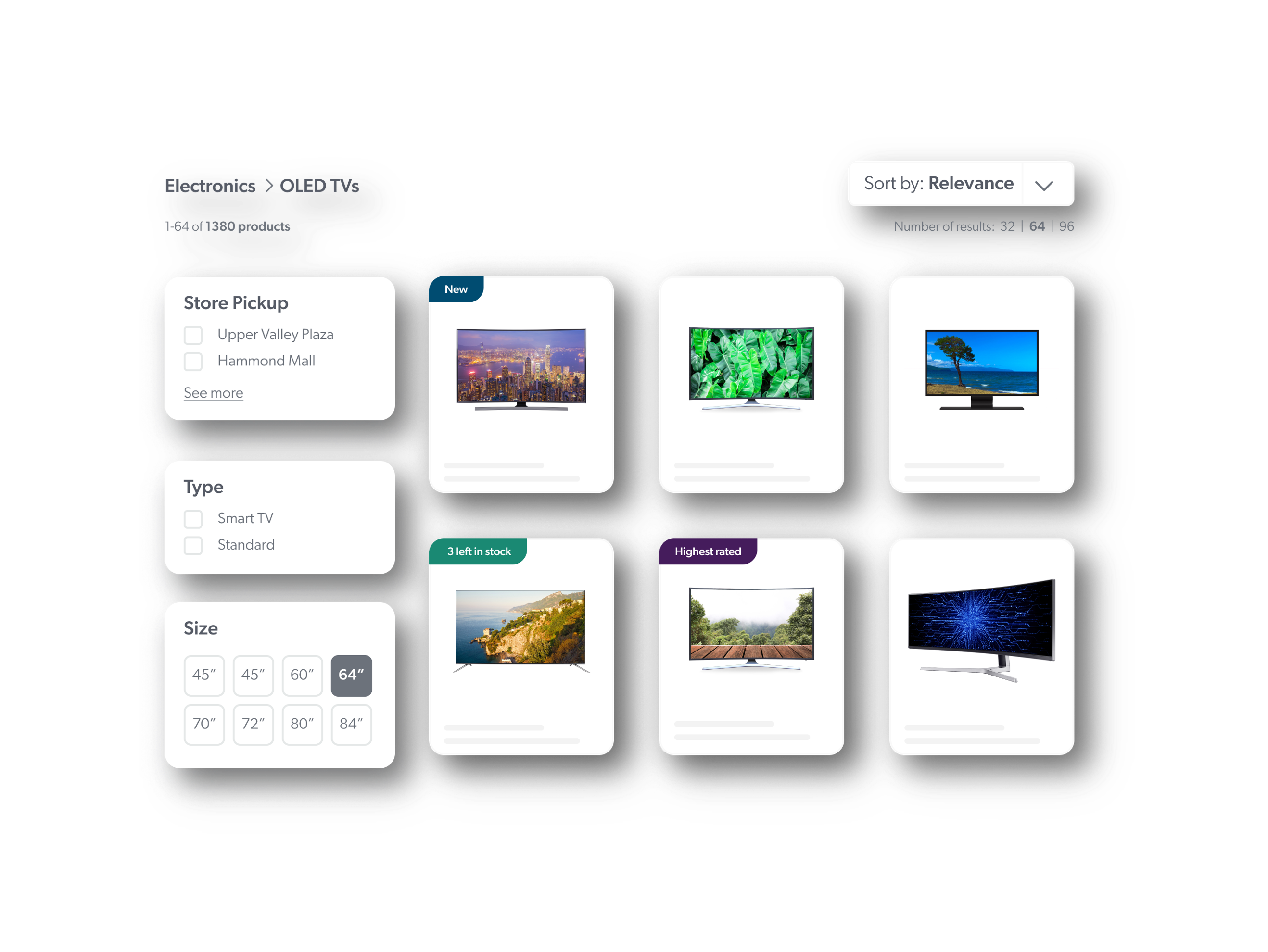
Coveo enhances the capabilities of commercetools by leveraging an advanced suite of AI and GenAI models that deliver relevant, 1:1 personalized, and conversational experiences while maximizing business outcomes at every touchpoint.
Coveo also empowers merchandisers by blending AI with manual controls, enabling them to leverage their creativity and expertise more effectively. This optimizes their time with AI while providing intuitive tools for focusing on value-added initiatives.
Trusted by over 750 leading enterprises, Coveo generates consistent KPI uplifts and optimizes ROI for some of the biggest organizations across B2C and B2B commerce, including Philips, Thalia, Caleres, Dow, and Fleetpride.
The Coveo platform is certified ISO 27001, HIPAA compliant, SOC2 compliant, and 99.999% SLA resilient.
Benefits
Improve Product Discovery with AI
Help customers find what they’re looking for with predictive search, AI-powered listing pages, and dynamic navigation. Guide them through even the largest, most complex product catalogs.
Create Richer Shopping Experiences
Boost site engagement and product discovery with personalized results and experiences that evolve in real time based on in-session behavior, without manual tuning or a high volume of data. Provide GenAI-powered answers to shopper questions to educate and guide them.
Empower Merchandisers
Enable your merchandising and business teams to unlock the full potential of your site experience with AI and intuitive controls. Allow them to optimize their time and focus on value-added initiatives to curate a better, more personalized customer experience.
Optimize KPIs
Deliver unmatched KPI optimization by showing shoppers the products most aligned with their current purchase intent, while maximizing your revenue and margins.
Features
AI Search and Recommendations
Apply machine learning models in just a few clicks to power AI search across all your sites and in multiple languages. Leverage Coveo’s suite of recommendation strategies to drive higher average order value. Help customers discover more of your product catalog and your expert content with personalized recommendations.
Optimized Listing Pages
Optimize listing pages for relevance, revenue per visit, and profitability with layered machine learning models. Enhance the experience by offering relevant filtering options. Coveo also makes it easy to add business rules such as product boosting, burying, or pinning.
Generative Answering (GenAI)
Use generative answering to guide shoppers to relevant products and keep customers on your site. Differentiate your brand by providing secure, accurate answers to complex product questions, showcasing your expertise.
Scalable Merchandising
Boost, bury, hide, and pin in just a few seconds. Manage facets intuitively and understand the impact of AI on rankings. The Coveo Merchandising Hub features intuitive workflows and a drag-and-drop UI, enabling easy campaign management and business logic layering without relying on IT.
Customer Insights
Get granular and actionable data into key performance metrics for search, product listings, and recommendation strategy performance as well as overall site revenue attribution.
Integrating Coveo and commercetools brings together best-in-class technologies, enabling enterprises to deliver superior digital commerce experiences while maintaining the flexibility, scalability, and performance required in modern Commerce.
Coveo’s Search and Product Discovery solution is the fully composable, MACH-certified platform that enterprises need to drive innovation and deliver the AI experiences their customers demand at every touchpoint.
Coveo's Merchandising Hub makes every decision and action easier to execute for merchandisers. Empowering them to easily manage search, listings and recommendations with an intuitive and visual editor and giving them full transparency into AI and ranking.
Coveo integrates with commercetools based architectures across three critical areas.
Indexing product catalogs
For enterprises using commercetools as their Product Information Management (PIM) system, Coveo’s API-first approach ensures that indexed product data is always up to date. Coveo provides a Stream API to push your product catalog data directly into Coveo’s index. Additionally, the Coveo Push API allows for real-time updates, ensuring that any changes in product information within commercetools are synchronized with the Coveo index. This seamless integration ensures that product data displayed to shoppers across the discovery journey are always accurate and relevant.
For more information please refer to our guide here: https://docs.coveo.com/en/o57a0186/coveo-for-commerce/use-in-commercetools
Build product discovery interfaces
Whether you’re building a sophisticated search interface, dynamic product listings or personalized recommendations, Coveo provides a range of UI libraries and REST APIs that can be easily integrated into any front-end framework. These different options give businesses the flexibility to choose the right approach to satisfy their objecitves, desired performance, and complexity.
Behavioral data tracking
Tracking user behavior on your storefront, such as product clicks, add to cart and transactions, is critical for both training Coveo’s AI models and for reporting on the value delivered to your business. Coveo’s event protocol is designed to simplify search and event tracking, minimize onboarding time, and improve data quality to enhance machine learning capabilities.


